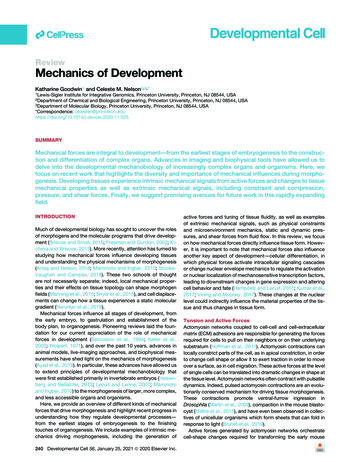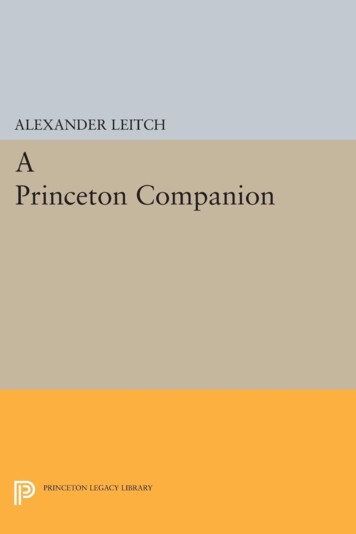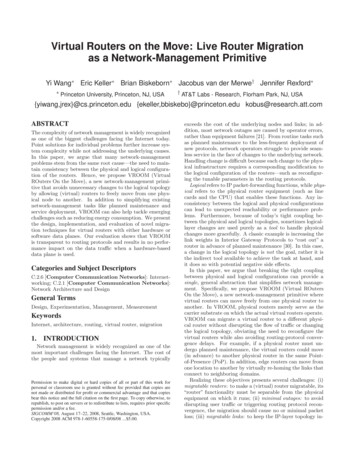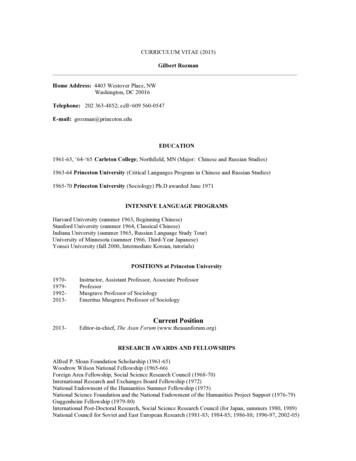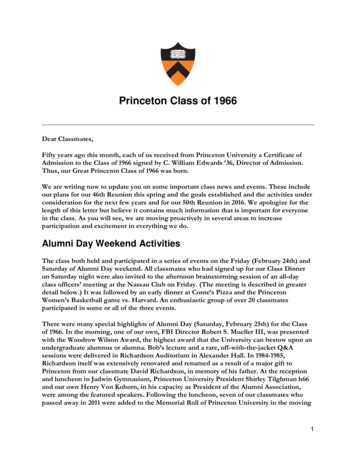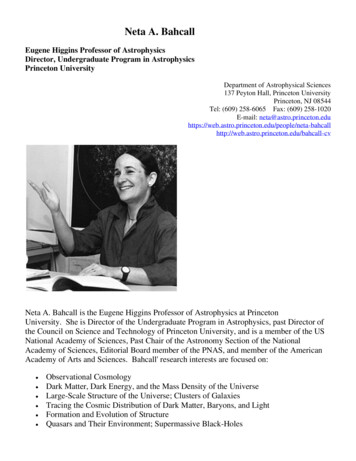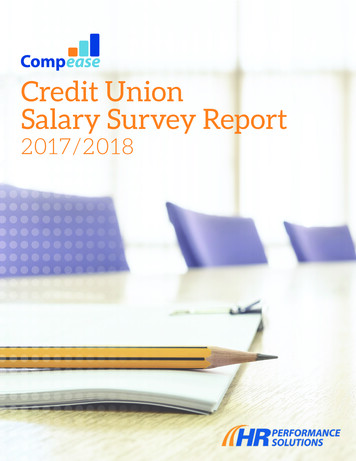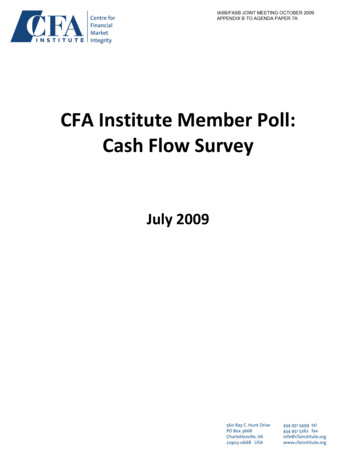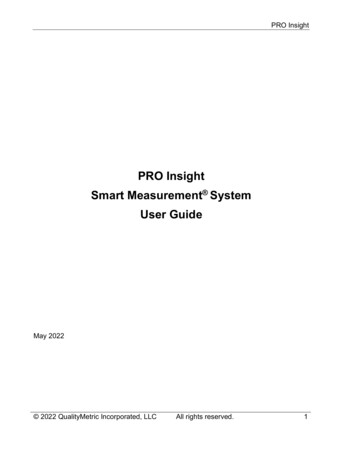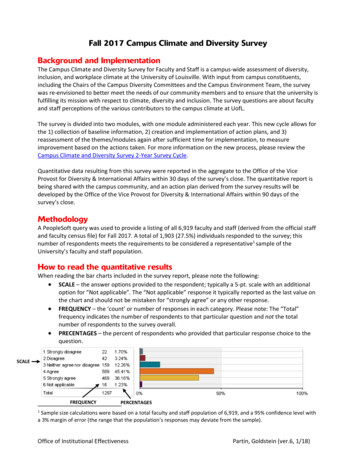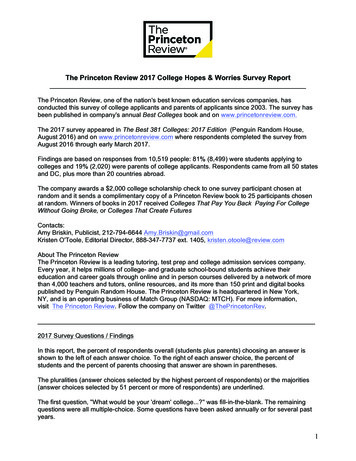
Transcription
The Princeton Review 2017 College Hopes & Worries Survey ReportThe Princeton Review, one of the nation's best known education services companies, hasconducted this survey of college applicants and parents of applicants since 2003. The survey hasbeen published in company's annual Best Colleges book and on www.princetonreview.com.The 2017 survey appeared in The Best 381 Colleges: 2017 Edition (Penguin Random House,August 2016) and on www.princetonreview.com where respondents completed the survey fromAugust 2016 through early March 2017.Findings are based on responses from 10,519 people: 81% (8,499) were students applying tocolleges and 19% (2,020) were parents of college applicants. Respondents came from all 50 statesand DC, plus more than 20 countries abroad.The company awards a 2,000 college scholarship check to one survey participant chosen atrandom and it sends a complimentary copy of a Princeton Review book to 25 participants chosenat random. Winners of books in 2017 received Colleges That Pay You Back Paying For CollegeWithout Going Broke, or Colleges That Create FuturesContacts:Amy Briskin, Publicist, 212-794-6644 Amy.Briskin@gmail.comKristen O'Toole, Editorial Director, 888-347-7737 ext. 1405, kristen.otoole@review.comAbout The Princeton ReviewThe Princeton Review is a leading tutoring, test prep and college admission services company.Every year, it helps millions of college- and graduate school-bound students achieve theireducation and career goals through online and in person courses delivered by a network of morethan 4,000 teachers and tutors, online resources, and its more than 150 print and digital bookspublished by Penguin Random House. The Princeton Review is headquartered in New York,NY, and is an operating business of Match Group (NASDAQ: MTCH). For more information,visit The Princeton Review. Follow the company on Twitter @ThePrincetonRev.2017 Survey Questions / FindingsIn this report, the percent of respondents overall (students plus parents) choosing an answer isshown to the left of each answer choice. To the right of each answer choice, the percent ofstudents and the percent of parents choosing that answer are shown in parentheses.The pluralities (answer choices selected by the highest percent of respondents) or the majorities(answer choices selected by 51 percent or more of respondents) are underlined.The first question, "What would be your 'dream' college.?" was fill-in-the-blank. The remainingquestions were all multiple-choice. Some questions have been asked annually or for several pastyears.1
1) What would be your "dream" college? What college would you most like to attend (or seeyour child attend) if chance of being accepted or cost were not an issue?"For this fill-in-the-blank question, respondents entered in names of more than 510 colleges,universities and other post-secondary institutions as their "dream college." Some schools werenamed by several respondents: others by only a few.The colleges most named by students as their "dream college" were:1/ Stanford Univ., 2/ Harvard Univ., 3/ Massachusetts Institute of Technology, 4/ New York Univ.,5/ Univ. of California—Los Angeles, 6/ Columbia Univ., 7/ Princeton Univ., 8/ Univ. of California—Berkeley, 9/ Univ. of Pennsylvania, 10/ Yale Univ.The colleges most named by parents as their "dream college" for their child were:1/ Stanford Univ., 2/ Princeton Univ., 3/ Harvard Univ., 4/ Massachusetts Institute of Technology, 5/Duke Univ., 6/ Univ. of Pennsylvania, 7/ Univ. of Michigan, 8/ New York Univ., 9/ Cornell Univ., 10/Univ. of Notre Dame.2) How many colleges will you (your child) apply to?The plurality (42%) of respondents said they/their child would apply to 5 to 8 colleges (no changefrom 2016). Thirty percent said they/their child would apply to 9 or more colleges (up 4% from2016).28%42%22%08%One to 4 (26% Students, 33% Parents)Five to 8 (42% Students, 45% Parents)Nine to 12 (23% Students, 18% Parents)Thirteen or more (09% Students, 04% Parents)Combined: 30% applying to 9 or more.3) What is / will be the toughest part of your (your child's) college application experience?The plurality (37%) of respondents chose the answer, "Taking the SAT, ACT or AP exams" (nochange from 2016). However, nearly as many respondents (33%) chose the answer, "Completingapplications for admission and financial aid": that was the answer most chosen by parents (34%).09% Researching colleges: choosing schools to apply to (08% Students, 14% Parents)37% Taking SAT, ACT, or AP exams (38% Students, 32% Parents)33% Completing applications for admission and financial aid (33% Students 34% Parents)21% Waiting for the decision letters: choosing which college to attend (21% Students, 20%Parents)4) Which college admission exam do you wish you (your child) could take if all of thefollowing options were available?The majority (57%) would prefer to take (or see their child take) the SAT, while 43% would prefer totake (or see their child take) the ACT. Students favored the SAT over the ACT by an 18% margin,while parents were "50/50" on the topic,57% The SAT (59% Students, 50% Parents)43% The ACT (41% Students, 50% Parents)5) How would you rate the college application guidance and support you (your child) have(has) received from your (your child's) high school college advisor / guidance counselor?2
On the whole, 63% of respondents viewed the support from their college advisors / counselorsfavorably (with 23% of that cohort rating them as "excellent"), while 37% rated them less favorably,with 10% saying "poor."23%40%27%10%Excellent (23% Students, 19% Parents)Good (41% Students, 39% Parents)Fair (27% Students, 30% Parents)Poor (9% Students, 12% Parents)6) What do you estimate your (or your child's) college degree will cost, including four yearsof tuition, room & board, fees, books and other expenses?Nearly 9 out of 10 respondents (85%) estimated their college cost will be more than 50,000 andwithin that cohort 43% estimated it to more than 100,000. Parents' estimates of college costswere higher than students': 61% of parents estimated the costs as more than 100,000 while 39%of students had this estimate.43% More than 100,000 (39% Students, 61% Parents)24% 75,000 to 100,000 (24% Students, 22% Parents)18% 50,000 to 75,000 (20% Students, 9% Parents)Combined: 85% said More than 50,00010% 25,000 to 50,000 (11% Students, 05% Parents)05% Less than 25,000 (06% Students, 03% Parents)7) How necessary will financial aid (education loans, scholarships or grants) be to pay foryour (your child’s) college education?Ninety-eight percent of respondents said financial aid would be necessary Within that cohort, 62%said it would be "extremely" necessary. Ten years ago (2007), the first year this question wasasked on the survey, 96% of respondents said financial aid would be necessary with only 51%gauging it "extremely" necessary62% Extremely (62% Students, 63% Parents)24% Very (25% Students, 21% Parents)12% Somewhat (11% Students, 13% Parents)Combined:98% said "Extremely," "Very," or "Somewhat" necessary.62% said "Extremely" necessary02% Not at all (02% Students, 03% Parents)8) What's your biggest concern about applying to or attending college?Debt has been the biggest concern among respondents (parents and students alike) for the pastthree years. The plurality (38%) said "Level of debt to pay for the degree" was their biggestconcern. This has been the biggest concern reported among the plurality since 2013. For the sixyears prior (2007 to 2012), the biggest concern among the plurality (34%) was "Will get into theirfirst choice college but won't have sufficient funds/aid to attend it." In 2006, the biggest concernamong the plurality (34%) was "Won't get into first-choice college."23% Won’t get into first-choice college (24% Students, 21% Parents)32% Will get into first-choice college, but won't be able to attend due to high cost and/orinsufficient financial aid (32% Students, 31% Parents)38% Level of debt I (my child) will take on to pay for the degree (37% Students, 41% Parents)07% Will attend a college I (my child) may not be happy about (07% Students, 07% Parents)9) How would you gauge your stress level about the college application process?3
Stress levels have consistently been high among respondents. This year, 98% reported stress, andseven out of 10 (76%) gauged their stress levels as "very high" or "high." In 2003, when ThePrinceton Review first conducted this survey, only 56% of respondents reported "very high" or"high" levels of stress. For this year, more students (77%) than parents (69%) reported high stresslevels.32% Very High (32% Students, 27% Parents)44% High (45% Students, 42% Parents)Combined 76% Very High or High (up 17% from 2003)22% Average (20% Students, 29% Parents)02% Low (02% Students, 02% Parents) 1% Very Low ( 1% Students, 1% Parents)10) Ideally, how far from home would you like the college you (your child) attend(s) to be?Parents want their children to attend college closer to home. The plurality (50%) of parents saidthey would like their child to attend a college less than 250 miles from home. The majority (68%) ofstudents said they would like to attend a college more than 250 from home. Among that studentcohort, 37% would prefer a college 500 miles from home and 16% wish they could attend acollege 1,000 miles from home.35%31%20%14%Less than 250 miles (32% Students, 50% Parents)250 to 500 miles (31% Students, 31% Parents)500 to 1,000 miles (21% Students, 11% Parents)More than 1,000 miles (16% Students, 08% Parents)11) When it comes to choosing which college you (or your child) will attend, which of thefollowing do you think it is most likely to be?Among respondents overall, 42% said they'd chose the college that's the "best overall fit" and 41%said they'd choose the college "best for their (their child's) career interests." However, a largernumber of students (42%) than parents (39%) said they'd choose the college "best for their careerinterests." Fewer than 1 of 10 respondents said they'd choose the college with the "best academicreputation" (09%) or the "most affordable" college (08%).09% College with best academic reputation (10% Students, 07% Parents)08% College that will be the most affordable (08% Students, 07% Parents)41% College with best program for my (my child's) career interests (42% Students, 39%Parents)42% College that will be the best overall fit (40% Students, 47% Parents)12) If you (your child) had a way to compare colleges based on their reputation with regardto specific majors or programs (i.e. which schools had excellent departments for "x"), howmuch would this contribute to your (your child’s) decision to apply to or attend a school?A solid majority (99%) of respondents said having information about colleges' reputations withregard to majors/departments would contribute "strongly," "very much," or "somewhat" to theirapplication/acceptance decisions with 84% of that cohort saying "strongly" or "very much."38% Strongly (37% Students, 40% Parents)46% Very Much (46% Students, 45% Parents)15% Somewhat (16% Students, 13% Parents)Combined 99% Somewhat, Very Much or Strongly01% Not Much (01% Students, 01% Parents) 1% Not at All ( 1% Students, 1% Parents)4
13) If you (your child) had a way to compare colleges based on their commitment toenvironmental issues (from academic offerings to practices concerning energy use,recycling, etc.), how much would this contribute to your (your child’s) decision to apply toor attend a school?A majority (64%) of respondents said having information about colleges' commitment toenvironmental issues would contribute "strongly," "very much," or "somewhat" to theirapplication/attendance decisions. (Up 3% from 2016.)06% Strongly (07% Students, 04% Parents)16% Very Much (16% Students, 15% Parents)42% Somewhat (43% Students, 39% Parents)Combined 64% Somewhat, Very Much or Strongly27% Not Much (26% Students, 31% Parents)09% Not at All (08% Students, 11% Parents)Note: Princeton Review resources for parents and students on this subject include: Green Ratingscores (from 60 to 99) that the company annually tallies for more than 860 colleges. The scoresappear in school profiles at www.princetonreview.com and in various Princeton Review books.More information is available at: reenguide/methodology.14) What will be the biggest benefit of your (your child) attending college and earning acollege diploma?The plurality (42%) view the main benefit of a college degree as "a potentially better job and higherincome" (down 2% from the plurality of 44% that chose this answer in 2016). Thirty-two percentconsider “exposure to new ideas” and 26% see “education" as the primary benefit.26% The education (25% Students, 27% Parents)32% The exposure to new ideas (34% Students, 26% Parents)Combined 58% chose answers related to education and learning42% The potentially better job and higher income (41% students, 47% Parents)15) On the whole, do you believe college will be "worth it" for you/your child?Respondents almost unanimously (99%) view college as worth their investment, as didrespondents to the 2016 survey.99% Yes (99% Students, 98% Parents).01% No (01% Students, 02% Parents).(Optional) What advice would you give to college applicants or parents of applicants goingthrough this experience next yearOn this open-ended question, "Start early" has been the advice most given by students andparents every year. About 50% of respondents say this. See samplers of students' and of parents'advice on the "College Hopes & Worries Survey" area of Princeton Review site rvey respondents – year over year:2016-17 / 10,519 people: 8,499 students and 2,020 parents2015-16 / 10,434 people: 8,347 students and 2,087 parents5
2014-15 / 12,062 people: 9,650 students and 2,412 parents2013-14 / 14,150 people: 10,116 students and 4,034 parents2012-13 / 14,125 people: 9,955 students and 4,170 parents2011-12 / 10,650 people: 7,455 students and 3,195 parents2010-11 / 12,185 people: 8,219 students and 3,966 parents2009-10 / 12,174 people: 9,132 students and 3,042 parents2008-09 / 15,722 people: 12,715 students and 3,007 parents2007-08 / 10,388 people: 8,776 students and 1,612 parents2006-07 / 5,854 people: 4,594 students and 1,260 parents2005-06 / 4,902 people: 3,890 students and 1,012 parents2004-05 / 3,930 people: 2,885 students and 1,045 parents2003-04 / 3,339 people: 3,036 students and 303 parents2002-03 / 1,003 people:901 students and 102 parents6
The Princeton Review 2017 College Hopes & Worries Survey Report _ The Princeton Review, one of the nation's best known education services companies, has conducted this survey of college applicants and parents of applicants since 2003. The survey has been published in company's annual Best Colleges book and on www.princetonreview.com.
